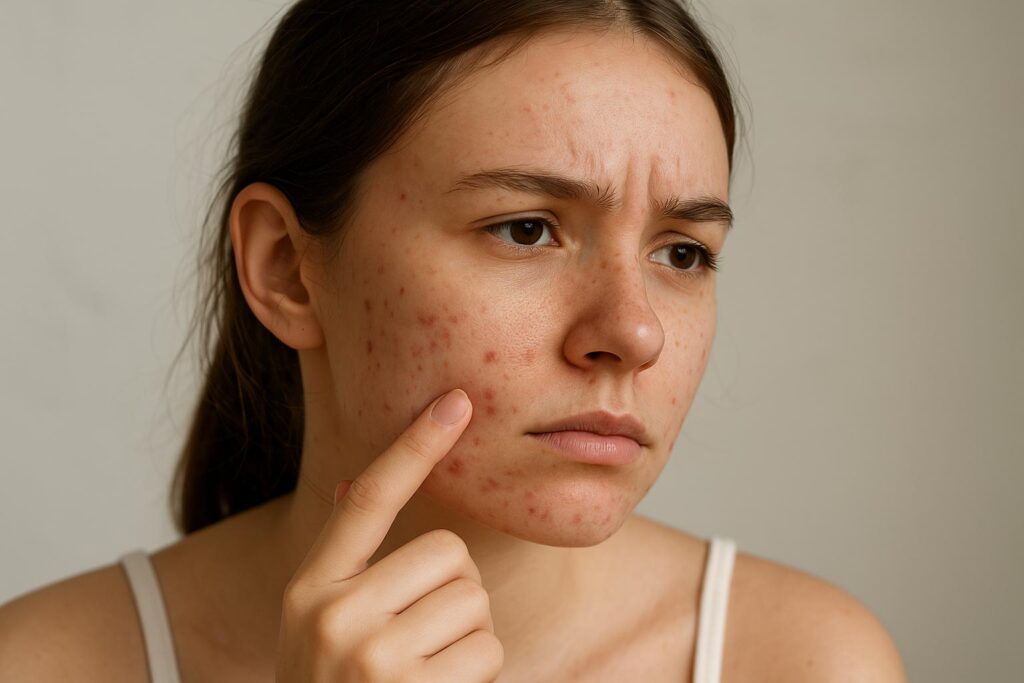Blemishes are one of the most common skin problems - and yet there are countless myths circulating about what is really behind them. In this article, we get to the bottom of the causes honestly and holistically - and beyond superficial explanations.
What actually counts as skin blemishes?
Before we look at the causes, it is worth taking a quick look at the question: What is actually covered by the term "blemishes"?
Typical manifestations:
- Blackheads (comedones)
- Pimples (papules, pustules)
- Underlays (cysts, lumps)
- Oily, coarse-pored skin
These phenomena have different origins - but they often overlap.
The 6 most common causes of skin blemishes
1. hormonal fluctuations - more than just a teenage problem
Hormones can have a strong influence on the appearance of the skin not only during puberty, but also during the menstrual cycle, stress or the menopause. The hormone Androgen stimulates sebum production - the skin appears oilier, the pores clog faster.
👉 Tip: Blemishes caused by the menstrual cycle often occur on the chin and lower jawline.
2. intestinal flora & microbiome - the skin as a mirror of the inside
A healthy gut makes a decisive contribution to clear skin. If the intestinal flora is disturbed by diet, medication (e.g. antibiotics) or stress, this can promote inflammatory processes on the skin.
👉 Tip: Fermented foods such as kimchi, sauerkraut or kombucha can help to strengthen the microbiome.
3. nutrition - an underestimated influencing factor
Sugar, white flour, dairy products and trans fats can promote inflammation - especially in people who are genetically or hormonally predisposed.
Striking: Many sufferers report skin deterioration after milk or whey protein.
4. stress - when the nervous system pulls the skin along with it
Cortisol, the "stress hormone", unbalances the skin. It increases sebum production and at the same time inhibits skin regeneration. Chronic stress can increase blemishes in the long term - especially for sensitive skin types.
5. incorrect or excessive skin care
Cleansing products that are too aggressive, constant exfoliation or drying agents such as high-percentage alcohol or benzoyl peroxide can worsen the skin's appearance - even though they are supposed to have the exact opposite effect.
👉 Tip: Less is often more. Gentle, barrier-protecting care is often the key.
6. environment & lifestyle
Fine dust, UV radiation, air conditioning, lack of sleep or nicotine - many external factors attack the skin barrier or promote inflammation. The skin becomes more susceptible to spots, redness and irritation.
Conclusion - skin blemishes (almost always) have several causes
In the rarest cases a single cause. It is often a combination of hormones, intestinal health, care, lifestyle and genetics. The important thing is: Not every face needs the same solution.
👉 Who the recognises individual triggerscan take targeted and long-term countermeasures - without radical products or diets.
Bonus - 3 questions you should ask yourself
- How does my skin react during periods of stress or before my period?
- What has my diet been like for the last 14 days?
- Do I use skincare products that suit my skin type - or simply what's on trend?
These questions are not a panacea, but they are a first honest step towards clarity.
